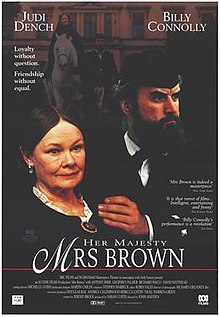
John Brown was a Scottish personal attendant and favourite of Queen Victoria for many years after working as a ghillie for Prince Albert. He was appreciated by many for his competence and companionship, and resented by others for his influence and informal manner. The exact nature of his relationship with Victoria was the subject of great speculation by contemporaries.
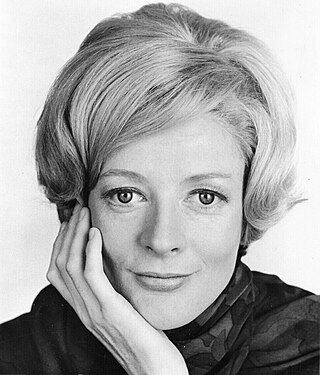
Dame Margaret Natalie Smith is an English actress. Known for her wit in comedic roles, she has had an extensive career on stage and screen over seven decades and is one of Britain's most recognisable and prolific actresses. She has received numerous accolades including two Academy Awards, five BAFTA Awards, four Emmy Awards, three Golden Globe Awards, and a Tony Award.

Dame Judith Olivia Dench is an English actress. Widely considered one of Britain's greatest actresses, she is noted for her versatile work in various films and television programmes encompassing several genres, as well as for her numerous roles on the stage. Dench has garnered various accolades throughout a career spanning over six decades, including an Academy Award, a Tony Award, two Golden Globe Awards, four British Academy Television Awards, six British Academy Film Awards and seven Olivier Awards.
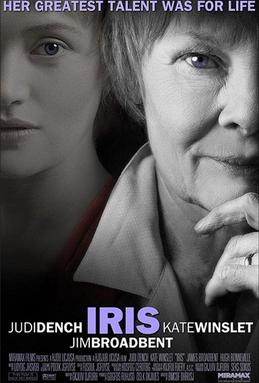
Iris is a 2001 biographical drama film about novelist Iris Murdoch and her relationship with her husband John Bayley. Directed by Richard Eyre from a screenplay he co-wrote with Charles Wood, the film is based on Bayley's 1999 memoir Elegy for Iris. Judi Dench and Jim Broadbent portray Murdoch and Bayley during the later stages of their marriage, while Kate Winslet and Hugh Bonneville appear as the couple in their younger years. The film contrasts the start of their relationship, when Murdoch was an outgoing, dominant individual compared to the timid and scholarly Bayley, and their later life, when Murdoch was suffering from Alzheimer's disease and tended to by a frustrated Bayley in their North Oxford home in Charlbury Road. The beach scenes were filmed at Southwold in Suffolk, one of Murdoch's favourite haunts.

Sir Stephen Arthur Frears is an English director and producer of film and television often depicting real life stories as well as projects that explore social class through sharply drawn characters. He has received numerous accolades including three BAFTA Awards, and a Primetime Emmy Award as well as nominations for two Academy Awards. In 2008, The Daily Telegraph named Frears among the 100 most influential people in British culture. In 2009, he received the Commandeur de l'Ordre des Arts et des Lettres. He received a knighthood in 2023 for his contributions to the film and television industries.

Mrs Henderson Presents is a 2005 biographical musical comedy-drama film directed by Stephen Frears and written by Martin Sherman. It stars Judi Dench, Bob Hoskins, Kelly Reilly, and Will Young. It tells the true story of Laura Henderson, an eccentric British socialite who opened the Windmill Theatre in London in 1931.

Best Actress in a Leading Role is a British Academy Film Award presented annually by the British Academy of Film and Television Arts (BAFTA) to recognize an actress who has delivered an outstanding leading performance in a film.

Major-General Sir Henry Frederick Ponsonby was a British soldier and royal court official who served as Queen Victoria's Private Secretary.

The Screen Actors Guild Award for Outstanding Performance by a Female Actor in a Leading Role in a Motion Picture is an award given by the Screen Actors Guild to honor the finest acting achievements in film.
Victoria Hamilton is an English actress.
Ecosse Films is a British film and television production company based in London. Ecosse Films produces programs for BBC, ITV, Channel 4, Showtime, Sky Atlantic, Starz Channel and WGBH.
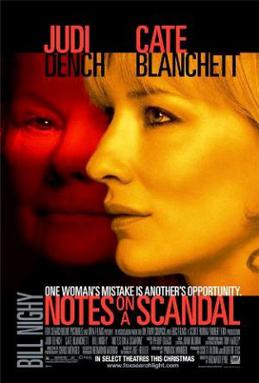
Notes on a Scandal is a 2006 British psychological drama film directed by Richard Eyre and produced by Robert Fox and Scott Rudin. Adapted from the 2003 novel of the same name by Zoë Heller, the screenplay was written by Patrick Marber. The film stars Judi Dench and Cate Blanchett and centres on a lonely veteran teacher who uncovers a fellow teacher's illicit affair with an underage student.
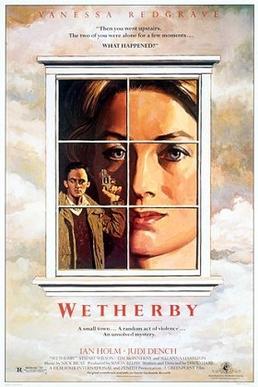
Wetherby is a 1985 British mystery drama film written and directed by playwright David Hare and starring Vanessa Redgrave, Ian Holm, Judi Dench, Stuart Wilson, Tim McInnerny, and Suzanna Hamilton.
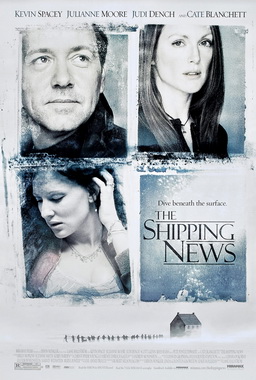
The Shipping News is a 2001 romantic drama film directed by Lasse Hallström from a screenplay by Robert Nelson Jacobs, based on the 1993 novel of the same name by E. Annie Proulx. It stars Kevin Spacey, Julianne Moore, Judi Dench, Scott Glenn, Rhys Ifans, Pete Postlethwaite, and Cate Blanchett. It follows an emotionally beaten man who moves with his daughter from Upstate New York to his ancestral home in a small Newfoundland fishing village.

84 Charing Cross Road is a 1987 British-American drama film directed by David Jones, and starring Anne Bancroft, Anthony Hopkins, Judi Dench, Mercedes Ruehl, and Jean De Baer. It is produced by Bancroft's husband, Mel Brooks. The screenplay by Hugh Whitemore is based on a play by James Roose-Evans, which itself is an adaptation of the 1970 epistolary memoir of the same name by Helene Hanff — a compilation of letters between Hanff and Frank Doel dating from 1949 to 1968. Several characters who are not in the play were added for the film, including Hanff's Manhattan friends and Doel's wife Nora.
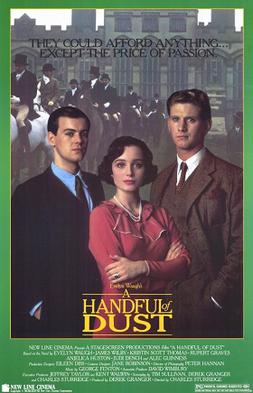
A Handful of Dust is a 1988 British film directed by Charles Sturridge, based on the 1934 novel of the same name by Evelyn Waugh. It stars James Wilby and Kristin Scott Thomas. Originally conceived as a television project, it was the first feature film financed by London Weekend Television.

Philomena is a 2013 drama film directed by Stephen Frears, based on the 2009 book The Lost Child of Philomena Lee by journalist Martin Sixsmith. The film stars Judi Dench as Philomena Lee, an elderly woman who has been searching for her son for 50 years, and Sixsmith's efforts to help her find him.
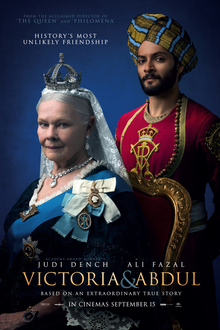
Victoria & Abdul is a 2017 British biographical historical drama film directed by Stephen Frears and written by Lee Hall. The film is based on the book Victoria & Abdul: The True Story of the Queen's Closest Confidant by Shrabani Basu, about the real-life relationship between Queen Victoria of the United Kingdom and her Indian Muslim servant Abdul Karim. It stars Judi Dench, Ali Fazal, Michael Gambon, Eddie Izzard, Tim Pigott-Smith, and Adeel Akhtar. The film had its world premiere at the 74th Venice Film Festival and was theatrically released on 15 September 2017 in the United Kingdom. It has grossed over $65 million worldwide.
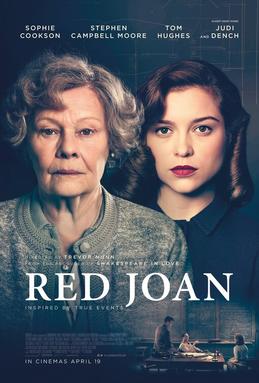
Red Joan is a 2018 British spy drama film, directed by Trevor Nunn, from a screenplay by Lindsay Shapero. The film stars Sophie Cookson, Stephen Campbell Moore, Tom Hughes, Ben Miles, Nina Sosanya, Tereza Srbova, and Judi Dench.
